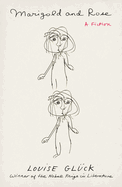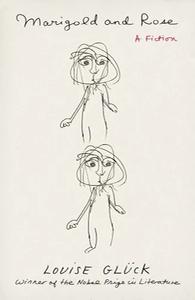
 In her 2020 Nobel Lecture, poet Louise Glück recounts a competition, devised in her childhood, to decide the very best of poetry; William Blake's Songs of Innocence and Experience emerged victorious. Written with her characteristic directness, the story springs fully to life in just a few sentences and establishes the tone for her lecture. With Marigold and Rose, her first foray into fiction, Glück makes perhaps another sly reference to Blake, giving readers a distinctive look at both innocence and experience through the eyes (and minds) of infant twins during their first year of life.
In her 2020 Nobel Lecture, poet Louise Glück recounts a competition, devised in her childhood, to decide the very best of poetry; William Blake's Songs of Innocence and Experience emerged victorious. Written with her characteristic directness, the story springs fully to life in just a few sentences and establishes the tone for her lecture. With Marigold and Rose, her first foray into fiction, Glück makes perhaps another sly reference to Blake, giving readers a distinctive look at both innocence and experience through the eyes (and minds) of infant twins during their first year of life.
Ever the poet, Glück chooses each word carefully and leaves only the necessary and true on the page, so Marigold and Rose is a decidedly slim volume, but it holds a wealth of insight. The narrative opens with "Marigold was absorbed in her book; she had gotten as far as the V," and progresses in an alternating close third-person, bouncing between the twins and their particular personalities. Though the twins are named, Father and Mother remain abstractions, vital but vague and formless. The children, however, are fully formed: Marigold is quiet and observant, already a writer ("That she couldn't read was an impediment. Nevertheless, the book was forming in her head"); Rose "was a social being," eager to please, quick to smile. Both see the other as central to their emerging story.
This short novel is inspired by the author's grandchildren, born during the lockdowns, which meant Glück observed their first year from a distance, via video. Under those circumstances, it would be easy for Marigold and Rose to slip into sentimentality. Instead, the simplicity of the subject matter serves to elevate each moment of brilliance. The babies are bathed, they sleep in separate cribs, they learn to drink from a cup--all ordinary moments that are somehow transfigured. Glück suggests that these moments of deep learning in early childhood are accompanied by equally deep interiority, giving Rose astute observations of her twin: "What an odd little thing she is, Rose thought. All her energy is in her head." Or Marigold ruminating on the transience of things: "Everything will disappear" even as she considers the concrete value of her growing vocabulary. In this way, Marigold and Rose becomes something more than observations of very young children; it is a reflection on life and learning, time and the passing of time, and always--always--the choosing of just the right words. --Sara Beth West, freelance reviewer and librarian
Shelf Talker: Poet Louise Glück's first work of fiction gives voice to the interior life of twin infants, combining depth and humor through the babies' innocent but perceptive observations.

